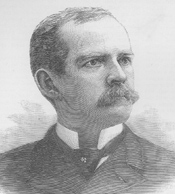John Henry Rogers facts for kids
Quick facts for kids
John Henry Rogers
|
|
|---|---|
 |
|
| Judge of the United States District Court for the Western District of Arkansas | |
| In office November 27, 1896 – April 17, 1911 |
|
| Appointed by | Grover Cleveland |
| Preceded by | Isaac Parker |
| Succeeded by | Frank A. Youmans |
| Member of the U.S. House of Representatives from Arkansas's 4th district |
|
| In office March 4, 1885 – March 3, 1891 |
|
| Preceded by | Samuel W. Peel |
| Succeeded by | William L. Terry |
| Member of the U.S. House of Representatives from Arkansas's 3rd district |
|
| In office March 4, 1883 – March 3, 1885 |
|
| Preceded by | Jordan E. Cravens |
| Succeeded by | Thomas Chipman McRae |
| Personal details | |
| Born |
John Henry Rogers
October 9, 1845 Bertie County, North Carolina |
| Died | April 17, 1911 (aged 65) Little Rock, Arkansas |
| Resting place | Oak Cemetery Fort Smith, Arkansas |
| Political party | Democratic |
| Education | Centre College University of Mississippi (A.B.) |
John Henry Rogers (born October 9, 1845 – died April 17, 1911) was an important figure in American law and politics. He served as a U.S. Representative for Arkansas. Later, he became a federal judge for the United States District Court for the Western District of Arkansas.
Contents
Early Life and Education
John Henry Rogers was born on October 9, 1845, in Roxobel, North Carolina. In 1852, his family moved to Mississippi. They settled near a place called Madison Station. John went to local schools there.
After the American Civil War, he continued his education. He attended Centre College. In 1868, he earned a degree from the University of Mississippi.
Military Service
In March 1862, when he was just 17, John Henry Rogers joined the Confederate States Army. He served as a private in the Ninth Mississippi Volunteer Regiment. He was wounded twice during his service.
He showed great bravery at the Battle of Franklin in Tennessee. Because of his courage, he was promoted to first lieutenant at age 19. He served in the army until the war ended in May 1865. After the war, he walked nearly a thousand miles to get back home to Mississippi.
Legal Career
After the war and his education, Rogers became a lawyer. He started his own law practice in Canton, Mississippi, from 1868 to 1869. He then moved to Fort Smith, Arkansas, and continued his law practice there until 1877.
From 1877 to 1882, he served as a judge. He was a judge for the Circuit Court of Arkansas in Pulaski County. After this, he returned to private law practice in Fort Smith until 1883.
Serving in Congress
John Henry Rogers was a member of the Democratic Party. He was elected to the United States House of Representatives. He represented Arkansas's 3rd and 4th congressional districts.
He served in Congress from March 4, 1883, to March 3, 1891. During his time, he led the Committee on Mileage for the 50th Congress. He decided not to run for re-election. After leaving Congress, he went back to practicing law in Fort Smith. He also remained active in politics, attending the Democratic state convention in 1892. He was also a delegate to the 1892 Democratic National Convention.
Federal Judge
In 1896, President Grover Cleveland chose John Henry Rogers to be a federal judge. He was appointed to the United States District Court for the Western District of Arkansas. This position became open when Judge Isaac Parker left.
The United States Senate approved his appointment on December 15, 1896. He served as a federal judge until his death on April 17, 1911. He passed away in Little Rock, Arkansas, from what appeared to be a heart attack. He was buried in Oak Cemetery in Fort Smith. He was survived by his wife, Mary Rogers, and their four children.
Family Life
John Henry Rogers was the son of Absalom and Harriet Rice Rogers. His father was a successful farmer.
 | Charles R. Drew |
 | Benjamin Banneker |
 | Jane C. Wright |
 | Roger Arliner Young |

